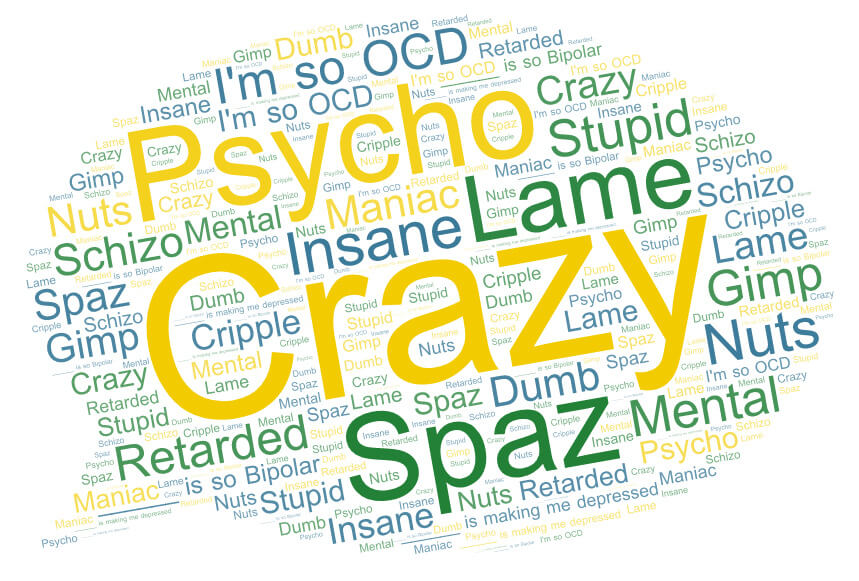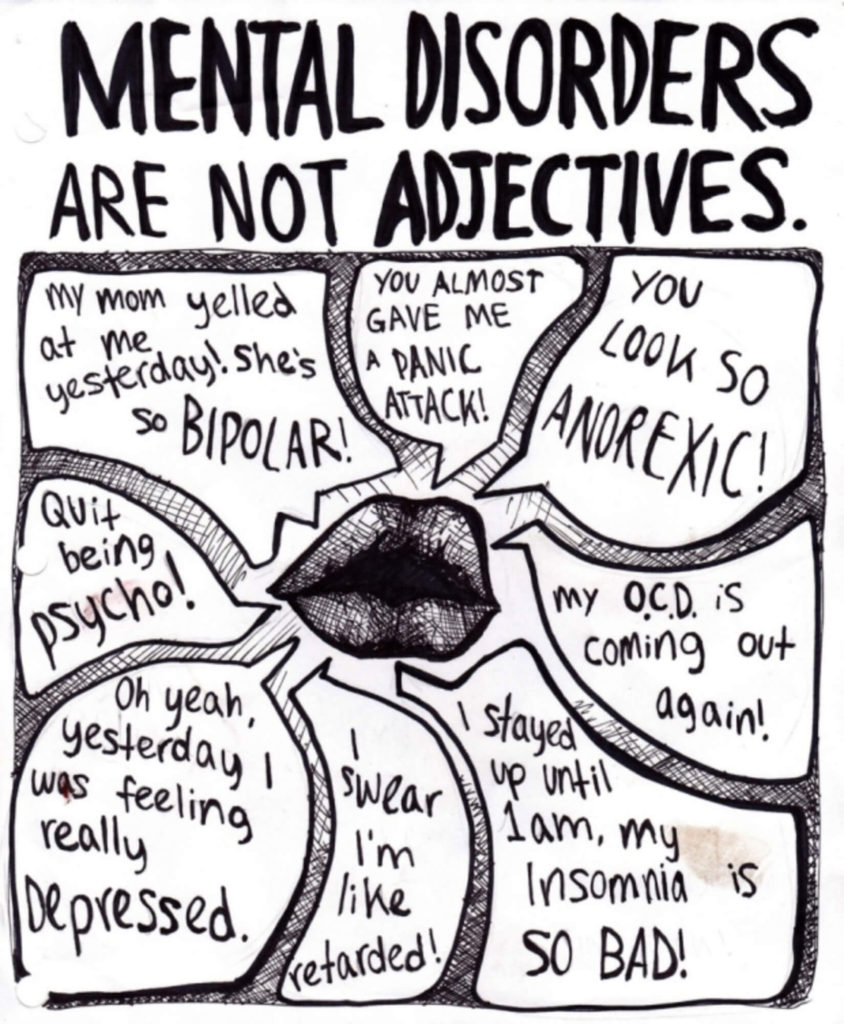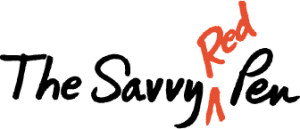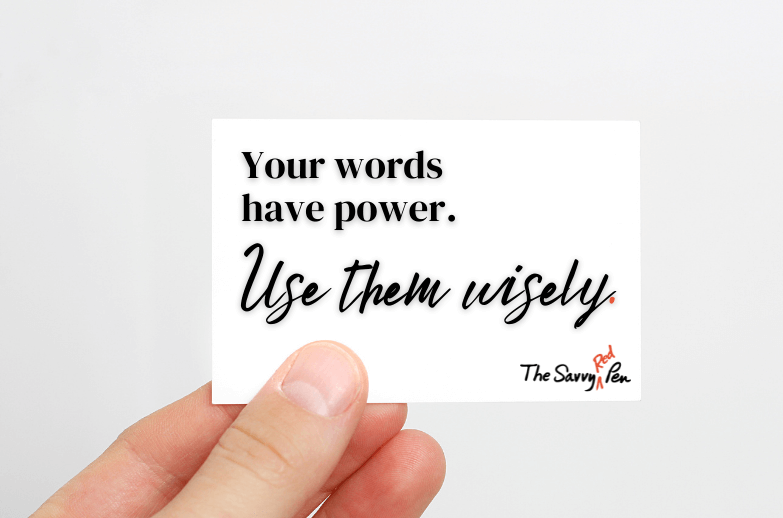Years ago, when I was a kid, I didn’t know I was using ableist language when I exclaimed, “You want me to get a A on that test? Are you nuts?” and “You’re so crazy, you’re acting like an idiot. You belong in the state hospital!” Or as an adult, when I have said, “You’re so OCD, you’re never on time!” or “I’ve explained the problem so many times, are you deaf?” I didn’t know I was using ableist language.
Now, I’m acutely aware.
The most recent national editors conference included four provocative, memorable sessions on ableist language. I took copious notes as I listened carefully to writers and editors who are experts in our profession who also happen to be disabled. They taught me why ableist language is so harmful and why I needed to be more mindful of the words and expressions I use on a daily basis. Many of us aren’t even aware that we’re using language that may cause harm to those around us, but understanding what ableist language is and why it’s so harmful to use can help you shift your mindset, just as I have had to shift mine.
What Is Ableist Language? Why Is It Such a Problem?


It’s difficult enough spelling ableist correctly, let alone knowing the definition. Ableist language is unintentional, hurtful language—words and phrases that sting, slam, and injure. These words have historically described people with both mental and physical disabilities. While this language has negative connotations, most people who use it are clueless about the harm they do to the disabled—and to the general human community. The exact words used in the definition indicate ableist language is a significant problem. Any use of language that hurts people is an issue. The childhood adage, “Sticks and stones may hurt my bones, but names will never hurt me” is absolute garbage.
Most people don’t realize one in four people in the U.S. have some kind of disability. Worldwide, the percentage is 15%—or a billion people. Using ableist language is a specific form of discrimination, and using it, even unintentionally, implies that disabled people are “less than.” When we use ableist language, we dehumanize and divide ourselves. We marginalize the disabled community and inadvertently set ourselves above them. We perpetuate stereotypes. Using ableist language both internalizes and reveals our unconscious biases.
When the Abled Become Part of the Disabled Community
Within the last several years as I have gotten older, my thyroid disease, fibromyalgia, arthritis, celiac disease, short-term memory loss due to a car accident, inherited chronic depression, and partial hearing loss have put me into a new category—the disabled. People don’t typically see me that way. I have all my body parts and move at a pretty fast clip. But I have become more aware of ableist language used in my presence, and I promise you, it hurts. Even though my hearing is “less than,” my radar goes up even more when I am on the receiving end of hurtful words.
Some of my maladies result in brain fog, difficulty focusing and remembering numbers and directions. One friend’s verbal bullets sound like, “I’ve told you these directions 12,000 times. Why can’t you remember or follow them? Do I have to draw you a picture?” The answer is sometimes yes. I am embarrassed and instantly shut down.
Sometimes I stumble over words and pause unnecessarily— or so it seems. Fast-brained people and those who talk a million miles an hour or mumble throw darts at me by saying in the most annoying fashion, “What’s wrong with you? You’re talking in slow-mo.”
Guess what? Our bodies and minds change, and we become vulnerable. Like it or not, fight it or not, we all become disabled at some point in our lives. So, we better watch our language.
How to Eliminate Ableist Language

Solving the problem isn’t all that easy because so many of us don’t even realize we are using ableist language, let alone are aware of the often unintentional harm we are causing to those around us. We need to draw attention to the words we are using, examining our own “go to” phrases. We need to think about them, not just use them and repeat them because someone else has used them repeatedly. Ableist language evolves just like slang, with phrases catching on and becoming widely accepted parts of our lexicon. Think, for example, about how the word “extra” came to mean “over the top” and is now widely used by almost every age group. Ableist language evolves the same way. The best way to get around unintentionally harming those around us with our words is to use more literal language.
This chart courtesy of the University of Fraser Valley Library should help us get started:
| Instead of these Ableist Words/Phrases | Use these alternatives: |
|---|---|
| _________ is so Bipolar. | Erratic, All over the place, Unreasonable, Back and Forth, Unstable |
| Lame | Bad, Awful, Gross, Uncool, Cheesy, Tacky, Corny |
| I’m so OCD. | Meticulous, Neat, Picky |
| Spaz, Retarded | Silly, Dorky, Cheesy, Nonsensical, Illogical |
| Stupid, Retarded | Frustrating, Pointless, Annoying, Perplexing, Irritating, Obnoxious, Confusing, Foolish, Silly |
| _______________ is making me depressed. | Upset, Sad, Blue, Disappointed |
| Crazy, Insane, Mental (meaning Intense) | Intense, Wild, Awesome, Very, Really, Amazing, Fascinating, Ridiculous,Unreal, Unbelievable |
| Crazy, Insane, Mental (meaning Absurd) | Unreasonable, Absurd, Outrageous, Unacceptable, Ridiculous, Unreal, Unbelievable |
| Psycho, Sociopath, Psychotic | Dangerous, Menacing, Threatening, Evil, Murderous, Strange, Criminal |
Words have power—the power to build up and tear down. Let’s use the power for right by testing out the horror of a phrase like, “Don’t be an idiot; get rid of ableist language.” I rest my case.
Want to stay current with language trends? Subscribe to the Savvy Red Pen Blog.
We also offer a full line of editorial services for authors, students, and businesses. Contact us today to learn more.
Related Articles
Using Gender-Neutral and Non-Binary Language to Honor All LGBTQ+ this PRIDE Month (and Beyond!)
Should Your Company Have a Corporate Style Guide?
Capitalization of “Black” & “White”: The Uppercase Argument

